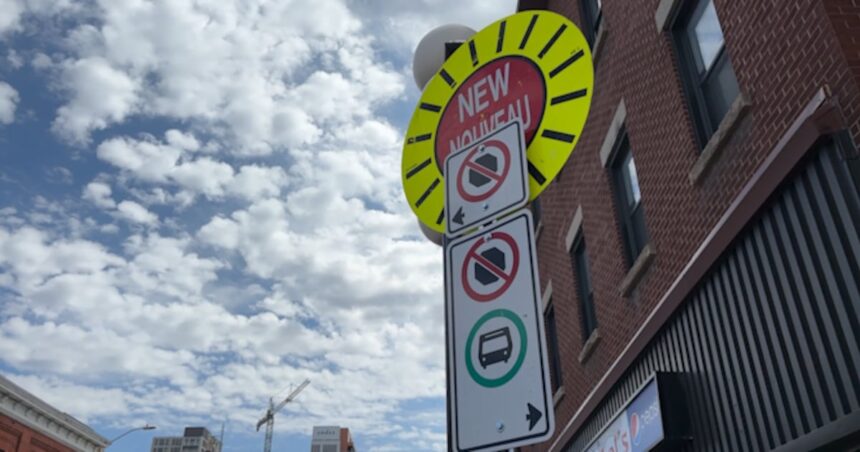As the chilly October wind whispers through the familiar corridors of Dalhousie Street, a new addition to the urban landscape has local business owners feeling the cold shoulder from City Hall. The recently installed “No Stopping” signs along a bustling section of Dalhousie have sparked considerable frustration among small business operators who claim they weren’t properly consulted about changes that directly impact their livelihoods.
“It happened overnight, literally,” says Marco Falsetto, owner of La Bottega Nicastro, a beloved Italian deli that has served the ByWard Market area for over two decades. “One morning, we arrived to open shop, and suddenly our customers couldn’t stop to pick up their orders. No warning, no discussion.”
The new signage prohibits vehicles from stopping between 7 a.m. and 7 p.m., eliminating what many businesses describe as crucial “quick stop” opportunities for customers. For establishments like La Bottega, which relies heavily on lunch hour traffic and take-out orders, the impact was immediate and concerning.
City officials from Ottawa’s Traffic Management department maintain the changes were implemented as part of ongoing efforts to improve traffic flow and safety along this corridor. According to transportation planner Jeanette MacDonald, “The section of Dalhousie between York and George streets has experienced significant congestion issues, particularly during peak hours, creating safety concerns for pedestrians and cyclists.”
But local entrepreneurs tell a different story. Sarah Mahmoud, who operates a small craft boutique three doors down from La Bottega, says her sales dropped nearly 20% in the first week after the signs appeared. “People used to pop in for five minutes to grab a gift on their way somewhere else. Now they text me saying they’ll order online instead because they can’t find anywhere to stop briefly.”
The timing couldn’t be worse for these small businesses. Many are still recovering from pandemic-related losses and facing the uncertainty of Ottawa’s traditionally slower winter months. The holiday shopping season represents a critical revenue period that some fear will be compromised by these new restrictions.
Councillor Mathieu Fleury, whose ward includes the affected area, acknowledges the concerns but suggests compromises may be possible. “We’re looking at potential modifications to the current restrictions, including time-limited stopping zones that would allow for brief customer pickups without impeding overall traffic flow,” Fleury stated during a community meeting held last Thursday at the Byward Market Community Centre.
What particularly irks business owners is what they describe as a pattern of insufficient consultation. “This isn’t about being against traffic improvements,” emphasizes Falsetto. “It’s about having a voice in decisions that directly affect our ability to keep our doors open.”
The Ottawa Small Business Association (OSBA) has taken up the cause, collecting over 200 signatures on a petition requesting the city review its decision. OSBA spokesperson Danielle Nguyen points out that similar situations in Montreal and Toronto led to compromises beneficial to both traffic management goals and business needs.
“The fifteen-minute stopping zones implemented in Toronto’s Kensington Market area provide a template that could work well here,” suggests Nguyen. “It balances the legitimate need for better traffic flow while recognizing the economic reality of small businesses that depend on convenience for their customers.”
Data from the city’s own economic development office indicates that small businesses along Dalhousie Street collectively employ over 300 people and generate approximately $12 million in annual revenue. Many owners worry about potential layoffs if the situation remains unchanged.
The controversy highlights the delicate balance city planners must strike between infrastructure improvements and supporting local economic ecosystems. Hassan Ibrahim, who has operated his family’s Middle Eastern bakery for fifteen years, puts it plainly: “Progress shouldn’t come at the expense of the very businesses that give this neighborhood its character.”
As someone who’s covered Ottawa’s development issues for over a decade, I’ve observed similar tensions play out across the city. When the O-Train expansion







